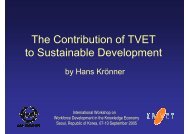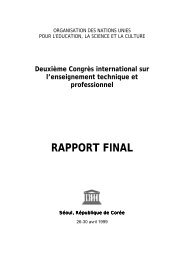Learning for Life, Work and the Future Initial ... - Unesco-Unevoc
Learning for Life, Work and the Future Initial ... - Unesco-Unevoc
Learning for Life, Work and the Future Initial ... - Unesco-Unevoc
You also want an ePaper? Increase the reach of your titles
YUMPU automatically turns print PDFs into web optimized ePapers that Google loves.
Page 44 Participants’ Papers <strong>Learning</strong> <strong>for</strong> <strong>Life</strong>, <strong>Work</strong> <strong>and</strong> <strong>the</strong> <strong>Future</strong><br />
3.4 Key skills<br />
There are two aspects to technical education. One is<br />
<strong>the</strong> purely mechanical one: filing, drilling, measuring<br />
an electronic circuit, setting a lady’s hair <strong>and</strong> sewing a<br />
dress can all be learned by exercise <strong>and</strong> repetition. The<br />
o<strong>the</strong>r aspect is that of key skills. Those are <strong>the</strong> skills<br />
that every person needs to master in order to be<br />
successful in life <strong>and</strong> work. The use of modern<br />
in<strong>for</strong>mation technology, numbers, communication,<br />
interpersonal skills <strong>and</strong> knowledge of <strong>the</strong> market place<br />
(entrepreneurial studies) all have to be integrated into<br />
<strong>the</strong> learning programme.<br />
When talking to future employers, one often hears <strong>the</strong><br />
complaint that <strong>the</strong> students may be good craftsmen but<br />
<strong>the</strong>y are unfit <strong>for</strong> <strong>the</strong> position because <strong>the</strong>y do not<br />
behave according to <strong>the</strong> rules, arrive late <strong>for</strong> work,<br />
don’t know how to communicate with customers <strong>and</strong><br />
don’t report on <strong>the</strong>ir activities correctly. Through <strong>the</strong><br />
key skills programme, <strong>the</strong> students should learn how to<br />
become valuable people <strong>for</strong> business <strong>and</strong> industry.<br />
4. <strong>Life</strong>long <strong>Learning</strong><br />
<strong>Learning</strong> does not stop at <strong>the</strong> graduation ceremony.<br />
Technical Education should always be ready to provide<br />
courses <strong>for</strong> workers who have to catch up with rapidlychanging<br />
technology. Such courses could be prepared<br />
on <strong>the</strong> initiative of <strong>the</strong> learning institutions, or be<br />
initiated by professional bodies.<br />
When a national Tourism Board discovers new areas of<br />
interest <strong>for</strong> potential tourists, it could approach <strong>the</strong><br />
national TVET Department with <strong>the</strong> request to prepare<br />
a module on that subject. The module could become<br />
part of <strong>the</strong> full-time learning programme, but since it is<br />
st<strong>and</strong>-alone, it could also be given as a separate course,<br />
taught in <strong>the</strong> evening <strong>and</strong>/or by distance education.<br />
<strong>Work</strong>ers who want to improve <strong>the</strong>ir value in <strong>the</strong> market<br />
could follow courses that are related to <strong>the</strong>ir function.<br />
For instance, <strong>the</strong> lady who works behind <strong>the</strong> counter in<br />
a shop <strong>for</strong> vehicle parts could take a “Front Desk”<br />
course: an IT course on how to work with <strong>the</strong> database<br />
on <strong>the</strong> computer, <strong>and</strong> a course to learn to identify<br />
different car parts.<br />
5. Conclusion<br />
The quality of Technical <strong>and</strong> Vocational Education can<br />
be greatly improved when <strong>the</strong> following measures are<br />
taken:<br />
• The mode of learning should take <strong>the</strong> individuality<br />
of <strong>the</strong> student into account<br />
• <strong>Learning</strong> should be outcomes-based<br />
• The curriculum should have a logical structure<br />
• The prospective employers should be involved in<br />
preparing <strong>the</strong> curricula<br />
• A good balance needs to be found between practical<br />
exercises <strong>and</strong> <strong>the</strong>ory<br />
• Generic or key skills need to be integrated in <strong>the</strong><br />
programmes<br />
• Facilities should be made available <strong>for</strong> working<br />
people to improve <strong>the</strong>ir skills.<br />
6 KAFERE, Godfrey (Malawi):<br />
<strong>Learning</strong> <strong>for</strong> <strong>Life</strong>, <strong>Work</strong> <strong>and</strong> <strong>the</strong> <strong>Future</strong> − The TVET System<br />
1. Background<br />
Since <strong>the</strong> birth of multi-party democracy in 1994, <strong>the</strong><br />
Malawi Government set itself a number of major goals:<br />
respect <strong>for</strong> <strong>and</strong> promotion of human rights, poverty<br />
alleviation, human resource development <strong>and</strong> employment<br />
generation. One of <strong>the</strong> main challenges facing<br />
Malawi today is <strong>the</strong> problem of unemployment among<br />
its future technical college graduates. Rural-urban<br />
migration is on <strong>the</strong> increase as gainful employment in<br />
agriculture becomes scarcer <strong>for</strong> <strong>the</strong> fast-growing labour<br />
<strong>for</strong>ce. By 1998 <strong>the</strong> <strong>for</strong>mal sector had a work<strong>for</strong>ce of<br />
760,000, of whom some 160,000 were in public service<br />
employment <strong>and</strong> 600,000 in <strong>the</strong> <strong>for</strong>mal private sector.<br />
Additionally, about 200,000 young people enter <strong>the</strong><br />
labour market every year <strong>and</strong> this number is expected<br />
to double until 2003. Currently, only 30,000 to 35,000<br />
new jobs are created in <strong>the</strong> <strong>for</strong>mal sector annually; <strong>the</strong><br />
rest of <strong>the</strong> people are unemployed. However, <strong>the</strong>se<br />
statistics include university graduates <strong>and</strong> those who<br />
have been trained at technical <strong>and</strong> vocational institutions.<br />
Unemployment is an undignified social status<br />
that should not be allowed in any country. Fortunately,<br />
self-employment is proving to be a viable alternative in<br />
Malawi.<br />
The mission of <strong>the</strong> Ministry of Labour <strong>and</strong> Vocational<br />
Training (MoVT) is to execute government social <strong>and</strong><br />
labour policy through administration <strong>and</strong> technical<br />
vocational education <strong>and</strong> training. The main objectives<br />
include:<br />
• to promote <strong>and</strong> maintain optimum social justice <strong>and</strong><br />
peace through <strong>the</strong> <strong>for</strong>mulation, review <strong>and</strong> implementation<br />
of dynamic labour <strong>and</strong> employment<br />
policies <strong>and</strong> strategies that contribute to <strong>the</strong><br />
country’s economic growth, national competitive-





